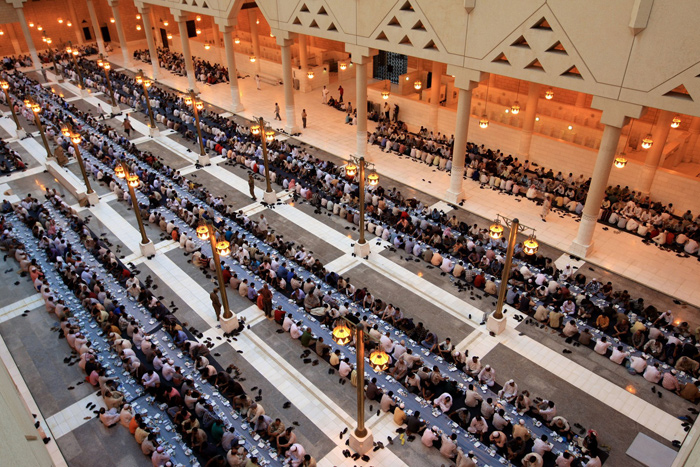The month of Ramadan is now blessing our days and most of us have a list of goals for those special occasions. Ramadan is the best time to give up bad habits and start good ones, as Prophet Muhammad (PBUH) taught us that devils are chained during this month and their power to distract and tempt us is diminished.
If one of your Ramadan goals is to live a more sustainable and eco-conscious lifestyle, as befitting Allah’s vice-regent on Earth, here are some tips to help you achieve that:
- Use reusable plates, cups and cutlery – far too often iftars are being served on plastic – or even worse – non recyclable Styrofoam plates which then end up in rubbish bins mixed with food leftovers. Just imagine the amount of plastic thrown everyday for the thirty days! Cut the waste by using your regular reusable plates, which are also far more elegant, and if you really need to use disposable dishes find the ones that are recyclable and make sure they get recycled.
- Share the plate – every minute of Ramadan is precious and we don’t want to waste it on housework, like washing the dishes. But rather than opting for disposable plates, serve the food on shared dishes, share and eat sunnah way!
- Take all you want, but eat all you take – this old motto is best followed every day, but especially during Ramadan. So don’t overfill your plate, you can always come for seconds. Also keep in mind that you won’t get much time to eat the leftovers, so only cook as much as you need and if anything is left give it away while still fresh.
- Lower your meal expectations – don’t expect your iftar to be a feast every day and don’t get used to luxuries. And imported foods are luxuries.
- Raise your food standards – as much as you can try to choose local and organic produce, or even better, grow your own fruit and vegetables. Organic food isn’t only better for our health, as it contains no toxic pesticides, but it also benefits the ecosystem. The pesticides and artificial fertilizers used in factory farming poison the rivers and kill the bees as well as deplete the soil. Choose locally grown foods to cut the carbon miles. Organic food is more expensive, but you can make transition gradually. Take one produce, let’s say apples, and starting from the first of Ramadan choose to buy only organic ones.
- Buy fair-trade – it might seem a novel concept, but fair-trade actually follows a very basic rule: { And if you do not, then be informed of a war [against you] from Allah and His Messenger. But if you repent, you may have your principal – [thus] you do no wrong, nor are you wronged.} (Surat Al-Baqarah 2:279). Fair-trade ensures that farmers at the basic level would be paid good price for their products and so their livelihood and small local economies would be sustainable. Check where your dates come from and remember that every purchase is a statement. Show solidarity with occupied Palestine by choosing fair-trade dates and olive oil produced by the region.
- Bring your own bottle – or your own cup whenever you are going to break fast outside, because you really don’t want to use the disposable plastic ones.
- Make green wudhu – the Prophet (PBUH) urged us not to waste water, even at the running stream, even during ritual ablution. So turn the faucet down or challenge yourself to do wudhu sunnah way this Ramadan – using only one mudd (approx. 625 ml) of water.

- Go slow, go carless – is your mosque in a walkable distance? Remember that: “Whoever purifies himself in his house then walks to one of the houses of Allaah in order to perform one of the duties enjoined by Allaah, for every two steps he takes, one will erase a sin and the other will raise him one degree in status.” (Hadith in Muslim). Walking to mosque is superior to riding, but if you have no choice but to get in the car perhaps you could organize tarawih carpooling?
Fasting in Ramadan makes us adhere to discipline and commitment, strictness that doesn’t lead to fanaticism or going outside the bounds that Allah has laid down. One can’t knowingly break the fast before the sunset, as this won’t be accepted by Allah.
Muslims should learn to be very committed in their lives, because they are people of an important message, which they mould their lives around.
Recognize that one can change for the better; the Prophet (PBUH) said: “Every son of Adam sins and the best of the sinners are those who repent.” (Ibn Maajah).
Make your motto (as Allah Almighty says what means): {So whoever does an atom’s weight of good will see it, And whoever does an atom’s weight of evil will see it.} (Surat Az-Zalzalah 99: 7-8).
